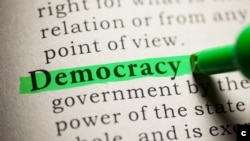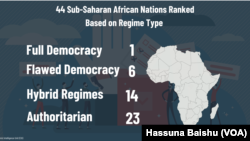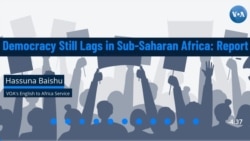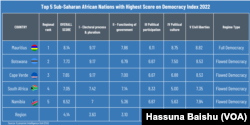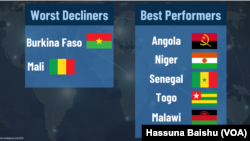The Democracy Index report by the London-based Economist Intelligence Unit (EIU) of the Economist Group rated the state of democracy across 167 countries — with a maximum score of 10 — based on five measures: electoral process and pluralism, the functioning of government, political participation, democratic political culture and civil liberties.
Here are some highlights on sub-Saharan Africa from the report.
Marginal improvement amid authoritarian grip
Nations in sub-Saharan Africa continue to be poorly ranked in the Democracy Index, with only Mauritius being classified as a full democracy and six as flawed democracies.
According to the study, the number of hybrid regimes remains unchanged at 14, while authoritarian forms of government still remain prevalent with 23 countries.
Although a small improvement of 0.02 points has been observed in the regional score, bringing it to 4.14 out of 10 — a slight increase from 4.12 in 2021 — it still lags behind the global average of 5.29, making sub-Saharan Africa the second-lowest ranked region in the world, surpassing only the Middle East and North Africa, which has an average score of 3.34.
"People have realize that democracy promised a lot and has delivered very little," professor Kwaku Nuamah of international politics at American University in Washington told VOA.
"What's important to the people in poor African countries is the ability to feed their families, the ability to find jobs, the ability to find cheap and affordable health care, and to find security and some sense of public order. And a lot of democratic regimes haven't provided this,"Nuamah said.
"Sometimes it's not their fault. There're problems that are structural that these governments sometimes inherit," he added.
The report attributed the improvement in the average regional score to a rise in the political culture category, where citizens are becoming more critical of military rule and more vocal in their disillusionment with such regimes.
This has been evident in the widespread protests against military rule in countries such as and Chad. This changing sentiment, the report says, reflects a growing desire for greater democratic freedoms and a more representative form of government.
Francophone vs Anglophone nations
While many French-speaking nations in Africa, such as Senegal, Niger and Togo, have been ranked as top performers, a closer examination of the recent report reveals a nuanced picture of the situation.
While it is true that French-speaking countries in Africa are making impressive gains, the data suggests that, on average, English-speaking countries in the region tend to be performing slightly better.
This can be seen in countries such as South Africa, Kenya, Ghana, and Zambia, where key indicators are performing above the regional average.
"France's presence has always guaranteed power to elites who are more inclined to support French interest not their own people, but it's also been harder to change corrupt governments in those countries. And so democracy has not really blossomed in this French speaking countries," Nuamah said.
Most and least improved nations
Out of the 44 countries the report examines in the region, 14 showed improvement in their score, with Angola, Niger, Senegal, Togo and Malawi at the top.
However, the scores for eight countries worsened, with Burkina Faso and Mali recording the largest declines.
In addition, a majority of 22 countries in the region saw their scores remain stagnant, indicating that the challenges faced by the region in promoting democratic ideals and practices persist.
"Institutions are crucial," said David Monda, an analyst and professor at City University of New York.
"In Kenya for example, the judiciary played a major role in making sure that democracy functions effectively, whereas in other countries in the region, the executive branch undermines it," Monda said.




